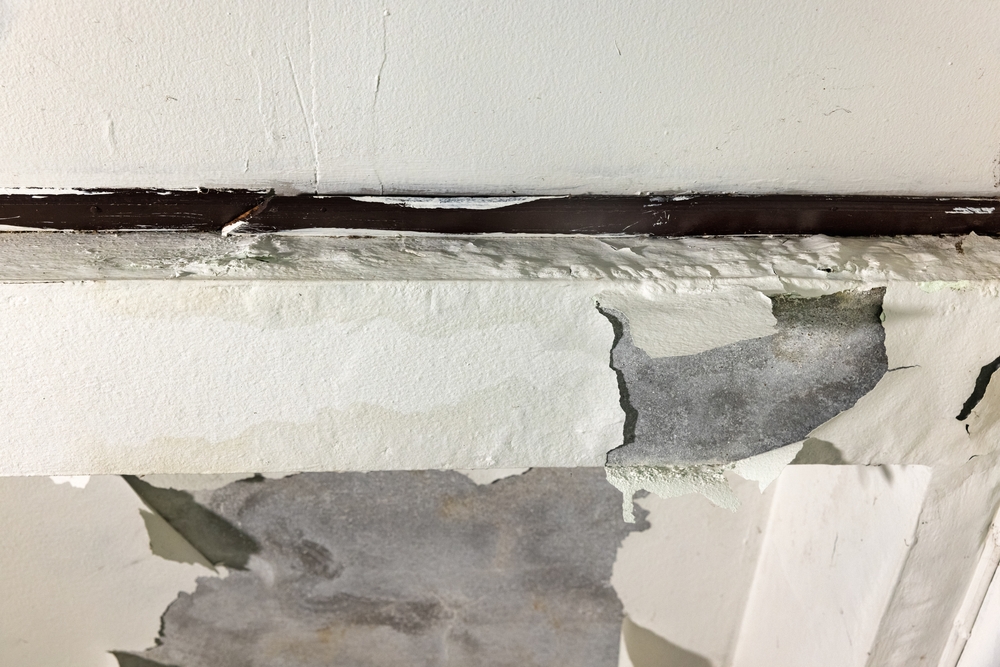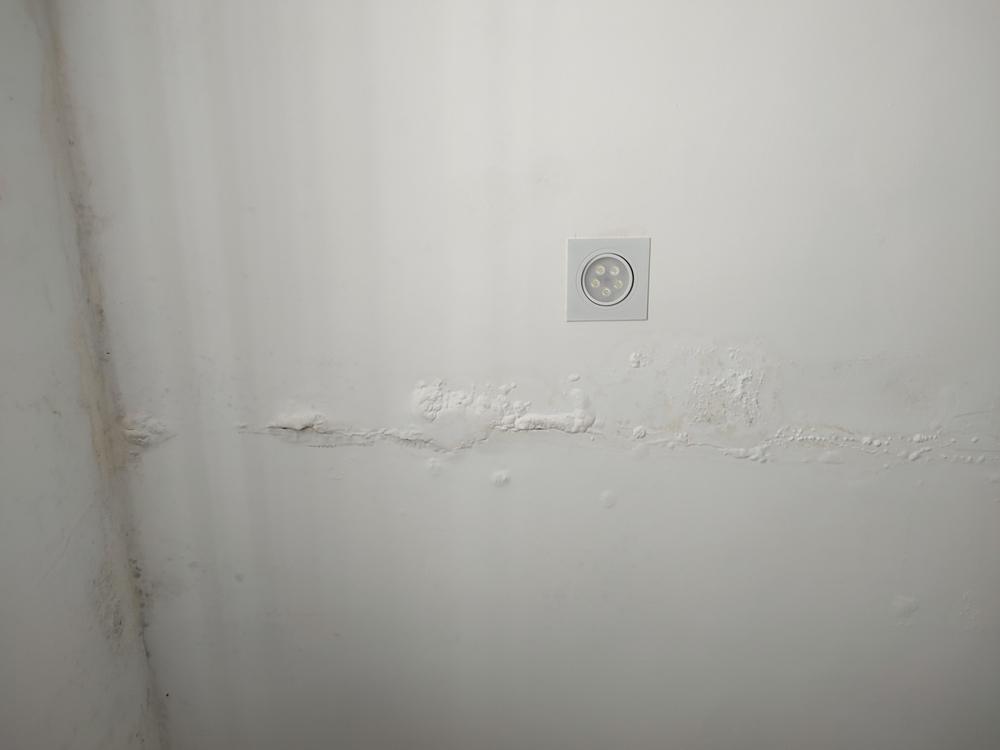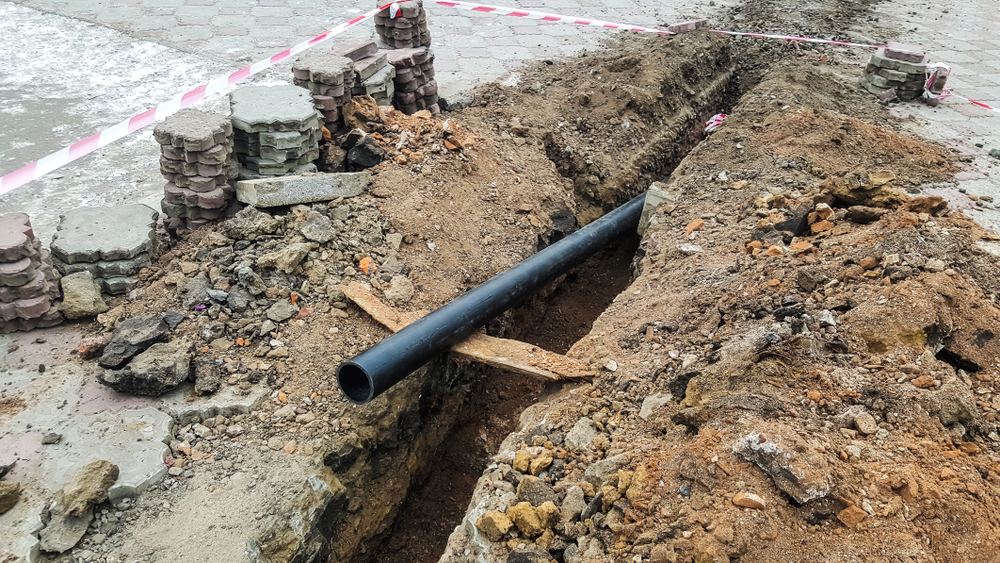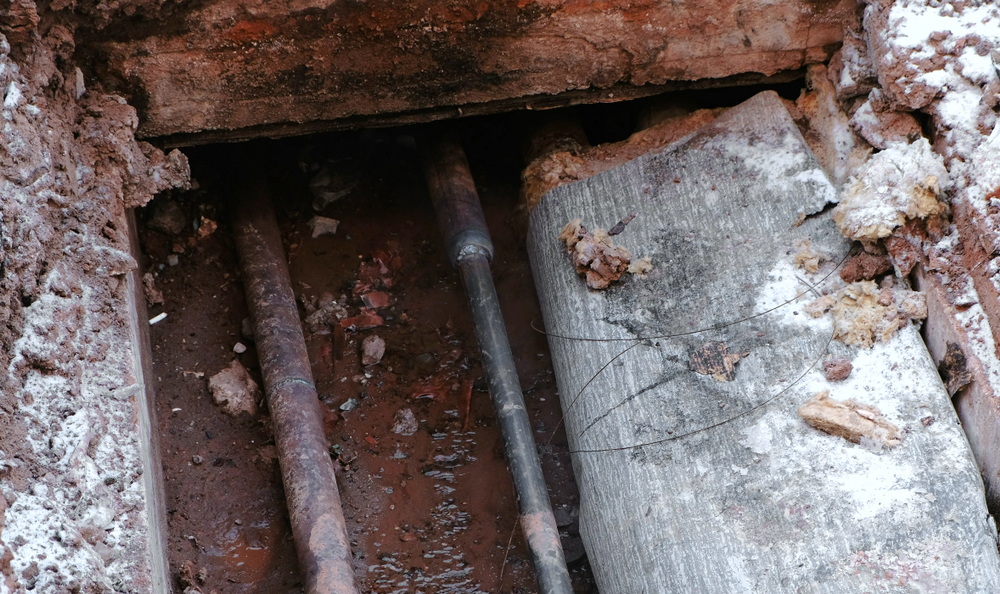Slab Leaks: What Causes Them and How To Detect Them
Water damage comes in many forms, with some being worse than others. Slab leaks are considered worse than others, and if nothing is done about them, they can cause serious damage to your home. Slab leaks strike quickly, and their damage potential cannot be underestimated.
Below, we will discuss what slab leaks are, along with how to spot them and contain them. Oftentimes, a slab leak requires professional attention, so if you believe you have a slab leak in your home, you should contact Lexington & Louisville’s plumbing experts at Dauenhauer.
You can schedule an appointment with us online or contact our 24/7 emergency service line at (502) 275-0400.

What Is a Slab Leak?
Slab leaks occur in homes that are built on a concrete foundation. If a leak develops in the water lines running below that concrete foundation, the home has a slab leak. These leaks can typically be found and unearthed rather quickly, but they can also cause heavy damage rather quickly. If you have a slab leak that goes unnoticed for a long period, then your home can suffer extensive water damage, so it’s important to pay attention to any and all warning signs.
How Common Are Slab Leaks?
Slab leaks are common in homes that use copper or galvanized steel pipes, as these pipes are prone to deterioration and excess leakage. Usually, older homes will have these kinds of pipes—so if you own an older home, it’s imperative that you have regular maintenance on your pipes. Pipe replacement may also be necessary in some cases.
Additionally, if you live in an area that deals with issues like earthquakes or soil erosion, your home’s pipes will take on excess stress and become more prone to slab leaks. Other elements exerting similar stress on your pipes include water with an imbalanced pH and debris-filled water, so if your area has water that is too acidic or too basic, slab leaks will be more of a concern.
How Serious Is a Slab Leak?
A slab leak is not an issue to take lightly. Even a minor slab leak is concerning, as it can rapidly worsen and cause extensive damage to your home. Slab leaks result in high water bills, but that’s not all they do: a bad slab leak will create various other problems, such as mold and mildew formation. These formations can make your home a less healthy environment, and they can indicate much greater problems on the horizon. If left alone, a serious slab leak can result in a total collapse of your home’s foundation.
Common Causes of Slab Leaks
We touched lightly on some potential causes of slab leaks, but let’s dive a little deeper. These causes are difficult to spot, but it is critical to be aware of them. Understanding where your home lies in terms of geographic location and water quality is key to predicting some of these issues, which include the following:
Poorly Built Foundation
Newer homes should not experience slab leaks. If you recently purchased a home and are experiencing a leak, contact a plumber so that they can inspect your home and analyze whether your foundation is conflicting with your water lines.
Earthquakes and Soil Erosion
If your home was built in a location prone to earthquakes and heavy soil erosion, your foundation and water lines will likely shift every now and then. This friction can result in slab leaks on occasion.
Water Corrosion
If your home’s water is noticeably hard or soft, it can wear pipes down over time, creating pinhole leaks. When unaddressed, a pinhole leak can become a serious slab leak.
An Old Home
If your home was built many years ago, then it likely has older pipes. Older pipes take on numerous issues over time, and it is not uncommon for them to corrode and eventually cause slab leaks. Regular pipe inspections are essential to preventing age-related slab leaks, as catching a leak early can be the difference between a quick cleanup and a full reconstruction of your home’s foundation.
Friction
Slab leaks are almost always caused by friction of some kind. Friction plays a huge part in the previously mentioned causes, as the weathering and corrosion of pipes are usually due to friction between the pipes and your home’s foundation. Earthquakes, hot water expanding pipes, and a poorly constructed, slightly-moving foundation can all create friction.

How To Detect a Slab Leak
Water stains on your floors or walls can signal that your home has a slab leak. By tracing the source of the water from those stains, you should be able to find out where the slab leak is coming from.
If you think your home has a slab leak but you can’t properly trace the source, you should contact a plumber immediately. Plumbers have numerous methods for detecting slab leaks, including specialized thermal imaging tools and sound equipment.
Slab Leak Warning Signs
As we’ve covered, it is essential to identify a slab leak in its early stages. To ensure that your home doesn’t experience any significant damage from a slab leak, what should you look for?
- An unusually high water bill
- The sound of running water, especially when no faucets or showers are running
- Wet floors
- Low water pressure
- Mold in corners and underneath carpets
Though these signs don’t always signal a slab leak, they are certainly common symptoms of one. Regardless of which issue you find, it is important to find its source. If you cannot find the source of your issue, contacting a professional plumber is highly recommended.

How To Fix a Slab Leak
Fixing a slab leak is no easy job. It requires specialized equipment and a wealth of knowledge and experience, so calling a plumber is typically the right thing to do. But if you think you have the know-how or are curious about what the process can be like, you can follow along below.
1. Find the Source of the Leak
To fix a slab leak, you almost always need to rip up the floor or concrete on top of the pipes, so it’s essential to know exactly where the leak is coming from first. If you don’t have the leak pinpointed, you will likely cause unnecessary damage to your floor by using guesswork.
2. Wear Protective Gear
Ripping up your floor can be a dangerous and unhealthy job when done with improper equipment. When taking on this task, be sure to wear the following:
- Goggles
- A breathing mask
- Steel-toe boots
- Gloves
- Dust-resistant, heavy-duty clothes
You will have to use powerful equipment when ripping up your floor and repairing a slab leak, so take any extra precautions as necessary. If you feel unsafe at any point during the process, it’s best to stop working and call a plumber instead. The slab leak repair experts at Dauenhauer are thoroughly trained in this process and provide 24/7 emergency service. You can contact us any time at (502) 663-8733.
3. Prepare the Correct Equipment
Repairing a slab leak requires the use of a jackhammer, so only proceed if you are experienced with this kind of power tool. The jackhammer is used to break through your home’s cement foundation, allowing you to easily reach your pipes.
Once you’ve excavated your pipes, you can begin repairing the slab leak. If you find that the leak is sourced from a sewage line, you should not attempt to repair it. A sewage line leak is extremely hazardous and should only be handled by a plumber with extensive experience.
4. Choose the Right Slab Leak Repair Option
A slab leak can be addressed in multiple ways, so it’s important to understand the possible courses of action, along with what might suit your situation best. Each method has its pros and cons, and some require more expertise than others. Experienced plumbers are trained in each of these methods, so they can give you run-downs of how each might affect your home and your finances differently.
Re-Piping or Pipe Rerouting
With this method, you avoid digging and ripping up your floor. New plumbing lines are installed to bypass the damaged pipe segment. If a small pipe segment is the culprit behind your slab leak, re-piping can be a good solution, allowing you to carefully install new pipes in walls or other concealed locations. Unfortunately, this method is not always an option, especially when the slab leak affects more than just a small pipe segment.
Tunneling Under Your Foundation
This approach reduces damage to your home’s interior, as you won’t have to dig up floors or break through walls. This means that you won’t have to worry about dust particles and broken concrete disrupting your day-to-day routine. However, tunneling differs from re-piping in that it absolutely requires the assistance and supervision of skilled professionals. If tunneling is done incorrectly, your home’s structural integrity could be at risk.
Breaking through the Slab
If you cannot tunnel or reroute to fix your slab leak, breaking through your home’s foundation with a jackhammer may be the only option. This method is not always ideal, as it can be highly disruptive and cause you to temporarily relocate from your home in some circumstances. This may be the only option at times, and while not totally desirable, it can be essential in protecting your home’s long-term structural integrity. A temporarily unearthed floor is always going to be better than a constantly flooded basement.
Trenchless Repair
Trenchless repair methods involve limited digging, making them a popular choice among homeowners looking to fix a slab leak. The most common trenchless repairs are pipe bursting and pipe lining. With pipe bursting, a new pipe is pulled through the old pipe, destroying the old pipe. With pipe lining, a new liner is inserted into the damaged pipe. The liner then hardens to form a new pipe inside the old.
These methods do have their drawbacks, though: pipe bursting does not work for every slab leak, and it requires highly specialized equipment to be done properly. Pipe lining also does not work for every slab leak, and the long-term durability of this method is in question.

How Much Does Slab Leak Repair Cost?
Each slab leak has its own characteristics, meaning that repair costs can vary depending on the difficulty associated with repairs. But on average, slab leak repair costs $2000 nationwide. Slab leak detection may cost anywhere from $150-$450.
Repairing a slab leak can seem expensive, but compared to the cost of repairing a home with extensive water damage, slab leak repair is well worth the money.
Is a Slab Leak Covered by Insurance?
Whether a slab leak is covered by insurance depends on the specifics of your policy. Generally, home insurance policies will cover sudden and accidental water damage, but not wear and tear. Most slab leaks result from wear and tear, but the sooner you detect your slab leak, the more likely you are to have a successful slab leak claim.
Dauenhauer understands the difficulties with sudden slab leak costs, and that is why we offer highly flexible financing options for repairs. Dealing with a slab leak is already stressful enough—we want to ensure that the financing does not add any further headaches.
Contact the Slab Leak Experts at Dauenhauer Today
Slab leaks are some of the most destructive types of water damage possible, and they are some of the most difficult for homeowners to fix, too. Dauenhauer is Kentucky’s leading plumbing contractor, meaning that we have the expertise to assess and fix slab leaks quickly and with as little disruption as possible.
A slab leak can make you feel as though your home is compromised, and it is our duty to restore your sense of peace as soon as we can. With our 24/7 emergency service, flexible financing options, highly qualified technicians, and state-of-the-art technology, our goal is simple: find the issue, fix it properly and quickly, and ensure that the customer is satisfied.
Your comfort is at the heart of everything we do. To ensure that your slab leak is handled properly, you can book an appointment with us or call our 24/7 emergency service at (502) 275-0400.